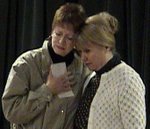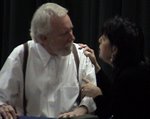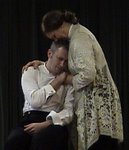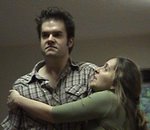The forms of things unknown, the poet's pen
Turns them into shapes, and gives to airy nothing
A local habitation and a name.
Wm Shakespeare - A Midsummer Night's Dream
I was asked this week, while casting actors in their scenes for AIRE, if a certain playwright was my “favorite” because it was observed that I frequently use the playwright’s work for actors at the retreat. Well, when one can offer great structure, beautiful verbiage, clear & compelling characters .... that is the kind of work I want actors to work on intensely for a week.
Believe it or not, for those of you who know me well, the discussion was not about Shakespeare, as one might presume.
Do I have a favorite playwright? I suppose, then, it might be Shakespeare but I LOVE Shaw’s wit, find Ibsen to be near perfect in structure, am always disturbed by Miller, am drawn to the simple characters of Foote, am compelled by the elegant language of Wilde and so on. I just read Good Night Desdemona, Good Morning Juliet and can’t say why my immediate visceral reaction was: “I must do this play.”
It is easier for me to say what productions have been my favorite recently because I feel that my standards for excellence in production have been raised. I simply want better, deeper, more truthful, and disturbing productions than most of what I see out there.
From a collection of comments I’ve made of late …
My favorite show recently in Tbilisi, at the GIFT International Arts Festival, was Waiting For Godot, a simple, spare, achingly funny and heartbreakingly lonely production. I can’t say I normally “like” Beckett but now I think that I haven’t respected productions of Becket. This one’s naked yearning for something to hope for in this life moved my spirit more than anything I've seen in a long time.
I loved John Patrick Shanley’s Doubt at Seattle Repertory Theatre. My friend, Maria, & I saw the show together and she, as I, was brought up in Catholic schools: she is Ireland & England, me here in the States. The play itself is so skillfully crafted: provocative, challenging, moving; the acting supported the play brilliantly. That we went out for a pint afterward but could not stop talking about it and could not come to a conclusion about who was “guilty”, who was “right” or what was the “truth” of the play, speaks to Shanley’s skillfully crafted piece of art and the Rep’s delicately deft production of it.
I recently read a new play, House and Home, written by a friend, Elaine Avila, and, though she is still working on the piece, it was one of the most cleanly developed plays I’ve read in a long time with fascinating characters, disturbing missed communications, clearly charted changes and reversals, that it made me hungry to do the show. Since I know the playwright, I hope to be so blessed.
I was talking with Ted Hoerl, another AIRE faculty member, about The Weir, a show he will be starring in shortly, and we both felt that many critics miss the simple power of the play. One critic said, “Nothing happens” and I screamed, “that’s makes me feel the same kind of rage as when people claim nothing happens in Chekhov.” ONE WORLD ENDS AND ANOTHER BEGINS BUT NOTHING HAPPENS IN CHEKHOV. Another critic said, “I’m not sure it’s a play, it seems to be a lot of stories.” Yes, STORIES WHICH CHANGE ALL THOSE PRESENT. Sigh. But it’s an Irish play with a roomful of Irish people telling Irish stories – how can nothing happen???? Great craic and I’m Irish, so am I biased? Sure but I’m talking about what I like, right?
So, how can I define what I’m looking for in a production?
As an artist, I'd rather have audiences be so uncomfortable that they leave the theatre, than so complacent in their response as to simply say, "That was fine." In a recent production of Native Son at the Intiman Theatre in Seattle, I was so deeply disturbed that I wanted to run out of the theatre and so compelled that I couldn't move to get out of my seat.
I read an interview with Peter Sellars (the director not Pink Panther) in which he said, and forgive me for paraphrasing, that it is our responsibility, in our contemporary multi-media society, to do more than move audiences to feel, which a well-produced tv commercial can do in 15 seconds, we must instead move them to some kind of change perhaps even some kind of action.
I think some of the most innovative, risky, compelling theatre I have seen recently was not the spectacular but simply truthful, thoughtful and emotionally naked work. Passionately truthful performances & rawly exposed souls onstage seem more risky to me than forced attempts at innovation, which turn out to be merely manipulation. I don't like feeling manipulated when I sit in a theatre so I assume most audiences don't appreciate it either.
In conclusion: innovative & exciting work seems to me to be that which is simply deeply human.
Turns them into shapes, and gives to airy nothing
A local habitation and a name.
Wm Shakespeare - A Midsummer Night's Dream
I was asked this week, while casting actors in their scenes for AIRE, if a certain playwright was my “favorite” because it was observed that I frequently use the playwright’s work for actors at the retreat. Well, when one can offer great structure, beautiful verbiage, clear & compelling characters .... that is the kind of work I want actors to work on intensely for a week.
Believe it or not, for those of you who know me well, the discussion was not about Shakespeare, as one might presume.
Do I have a favorite playwright? I suppose, then, it might be Shakespeare but I LOVE Shaw’s wit, find Ibsen to be near perfect in structure, am always disturbed by Miller, am drawn to the simple characters of Foote, am compelled by the elegant language of Wilde and so on. I just read Good Night Desdemona, Good Morning Juliet and can’t say why my immediate visceral reaction was: “I must do this play.”
It is easier for me to say what productions have been my favorite recently because I feel that my standards for excellence in production have been raised. I simply want better, deeper, more truthful, and disturbing productions than most of what I see out there.
From a collection of comments I’ve made of late …
My favorite show recently in Tbilisi, at the GIFT International Arts Festival, was Waiting For Godot, a simple, spare, achingly funny and heartbreakingly lonely production. I can’t say I normally “like” Beckett but now I think that I haven’t respected productions of Becket. This one’s naked yearning for something to hope for in this life moved my spirit more than anything I've seen in a long time.
I loved John Patrick Shanley’s Doubt at Seattle Repertory Theatre. My friend, Maria, & I saw the show together and she, as I, was brought up in Catholic schools: she is Ireland & England, me here in the States. The play itself is so skillfully crafted: provocative, challenging, moving; the acting supported the play brilliantly. That we went out for a pint afterward but could not stop talking about it and could not come to a conclusion about who was “guilty”, who was “right” or what was the “truth” of the play, speaks to Shanley’s skillfully crafted piece of art and the Rep’s delicately deft production of it.
I recently read a new play, House and Home, written by a friend, Elaine Avila, and, though she is still working on the piece, it was one of the most cleanly developed plays I’ve read in a long time with fascinating characters, disturbing missed communications, clearly charted changes and reversals, that it made me hungry to do the show. Since I know the playwright, I hope to be so blessed.
I was talking with Ted Hoerl, another AIRE faculty member, about The Weir, a show he will be starring in shortly, and we both felt that many critics miss the simple power of the play. One critic said, “Nothing happens” and I screamed, “that’s makes me feel the same kind of rage as when people claim nothing happens in Chekhov.” ONE WORLD ENDS AND ANOTHER BEGINS BUT NOTHING HAPPENS IN CHEKHOV. Another critic said, “I’m not sure it’s a play, it seems to be a lot of stories.” Yes, STORIES WHICH CHANGE ALL THOSE PRESENT. Sigh. But it’s an Irish play with a roomful of Irish people telling Irish stories – how can nothing happen???? Great craic and I’m Irish, so am I biased? Sure but I’m talking about what I like, right?
So, how can I define what I’m looking for in a production?
As an artist, I'd rather have audiences be so uncomfortable that they leave the theatre, than so complacent in their response as to simply say, "That was fine." In a recent production of Native Son at the Intiman Theatre in Seattle, I was so deeply disturbed that I wanted to run out of the theatre and so compelled that I couldn't move to get out of my seat.
I read an interview with Peter Sellars (the director not Pink Panther) in which he said, and forgive me for paraphrasing, that it is our responsibility, in our contemporary multi-media society, to do more than move audiences to feel, which a well-produced tv commercial can do in 15 seconds, we must instead move them to some kind of change perhaps even some kind of action.
I think some of the most innovative, risky, compelling theatre I have seen recently was not the spectacular but simply truthful, thoughtful and emotionally naked work. Passionately truthful performances & rawly exposed souls onstage seem more risky to me than forced attempts at innovation, which turn out to be merely manipulation. I don't like feeling manipulated when I sit in a theatre so I assume most audiences don't appreciate it either.
In conclusion: innovative & exciting work seems to me to be that which is simply deeply human.
Besides, as Jonathan Winters says, "Only the mediocre are always at their best." I find it hard to believe I didn't get that quote, speaking of my favorites, in the last blog post.
Other than that.... ML























2 comments:
Interesting stuff. I'm not sure I agree with Sellars, though. Is that really what theatre is for? I have my doubts...but no time right now to work them all out.
I'm not sure I always agree with Sellars, having worked with him, but our work together was on a Brecht production so ... in meeting the challenge of epic theatre's style, he was pushing us toward stronger alienation technique. I don't mind picking up the gauntlet, however, and striving for leaving the audience with something that lasts longer than the two hours their butts are in the seats. Even if they're still talking as they head to the parking lot, the impression made is deeper than an advert on the telly.
Good luck with marking, C, and post your doubts when you come up for air. M
Post a Comment